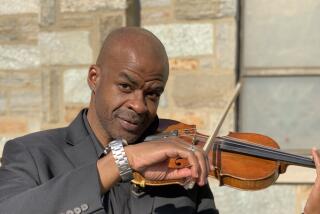Nicolas Slonimsky, Conductor and Lexicographer, Dies : Music: Russian-born scholar’s knowledge and body of work were legendary. He was 101.
- Share via
Nicolas Slonimsky, the Russian-born composer and conductor who became one of the world’s foremost musical lexicographers, died Monday at UCLA Medical Center. He was 101.
Though not well-known outside the music world, the eccentric Slonimsky was a legend within it, renowned not only for his encyclopedic knowledge and prodigious body of work but also for his antic humor.
Pierre Boulez was among his friends; so was the late Frank Zappa. In fact, after Zappa sought him out in the early 1980s, Slonimsky performed one of his own compositions at a Zappa concert and enlisted the progressive rocker’s daughter, Moon Zappa, to teach him Valley-speak. The musicologist and scholar later told reporters in his Russian-tinged accent that he had named one of his beloved cats Grody To The Max in her honor.
Born in czarist St. Petersburg on April 27, 1894, Slonimsky came from a family of intellectuals.
In the autobiography--which he had planned to title “Failed Wunderkind: A Rueful Autopsy” but was eventually released at his publisher’s insistence as “Perfect Pitch”--he reported that his mother told him at age 6 that he was a genius.
“This revelation came as no surprise to me,” Slonimsky wrote.
Possessed of perfect pitch, Slonimsky was first taught piano by his maternal aunt, but by age 10, he had begun to improvise. After graduating from St. Petersburg High School in 1912, he studied at the University of St. Petersburg and the St. Petersburg Conservatory of Music, where he learned music theory and composition from the same teachers who had mentored Shostakovich, Stravinsky and Prokofiev.
By the 1920s, he was a touring concert pianist--a job that eventually landed him a post in the United States, where he was summoned in 1923 to coach opera at the Eastman School of Music in Rochester, N.Y. Able to speak only four words of English--”yes,” “thank you,” and “please”--he gradually taught himself the language by studying the librettos of the Gilbert and Sullivan operas and the ads in the Saturday Evening Post.
Two years later, the conductor of the Boston Symphony Orchestra heard Slonimsky at Rochester and invited him to move to Boston as his secretary and companion. There, he published two collections of songs, conducted the Harvard University orchestra and organized the Chamber Orchestra of Boston. In 1928, he composed the song, “My Little Pool,” which has only 12 bars and calls for only black keys in the left hand and white keys in the right. It was during this period that he also met and married the former Dorothy Adlow, an art critic and lecturer.
By the 1930s, he was an ardent champion of 20th-century music, conducting, for example, the piano concerto of Bela Bartok with the composer as soloist and the Berlin Philharmonic in programs of modern American music.
But his penchant for presenting new music doomed his conducting career. In 1933, after conducting the L.A. Philharmonic to considerable acclaim, he was engaged to conduct the philharmonic’s summer season at the Hollywood Bowl. Insisting on the importance of exposing contemporary audiences to contemporary music, he tried to force-feed modern music to the staid Los Angeles audience with disastrous results. The orchestra mutinied, the trustees intervened and, as Slonimsky later put it, he was “given the bum’s rush out of Hollywood.” His conducting career suddenly began to break up.
But Slonimsky, by now a parent, embarked on a second career, turning from the music itself to scholarly research and documentation. His “Music Since 1900,” comprising a chronology of almost 2,000 musical events and biographies, was published in 1937, and characterized as a landmark of American musical scholarship.
Subsequent books also were destined to become standards--”Thesaurus of Scales and Melodic Patterns,” for instance, is still widely used by composers and jazz musicians. He also wrote the “Lexicon of Musical Invective,” an extensive and amusing anthology of scathing music critiques, and “Baker’s Biographical Dictionary of Musicians.”
Despite his bad experience at the Hollywood Bowl, Slonimsky eventually moved to Los Angeles in the 1960s, after his wife’s death. Here, he taught musical subjects at UCLA.
He is survived by his daughter, Electra Yourke of New York, and two grandchildren.
More to Read
The biggest entertainment stories
Get our big stories about Hollywood, film, television, music, arts, culture and more right in your inbox as soon as they publish.
You may occasionally receive promotional content from the Los Angeles Times.










